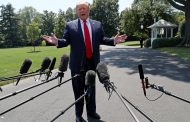
Trump and Putin: Who wins a game of an ex-KGB Colonel versus a business tycoon turned president of the US?
Can Trump still make America great while simultaneously pointing accusing fingers at China, renewing sanctions against Russia and Iran, virtually at war with North Korea and insulting African Leaders? This is the question observers of US great power politics are asking in the wake of Donald Trump’s simultaneous moves against China, Russia, Iran, North Korea and hostile remarks against African leaders.
Trump signed into law earlier today a new wave of sanctions against Russia at the same time that Rex Tillerson, the American Secretary of State said US-China relations is at a crossroad, wondering if it could be renegotiated back to status quo. The United States feels China has taken the thunder from its feet in trade advantages. China has since become the workshop of the world based on a much more systematic, state guided industrialisation strategy underpinned by a vast human population that make American investors migrate there. The pain about this came out most dramatically in January 2012 when Steve Jobs, Apple mastermind, told Barrack Obama it would not be business but charity for him to bring the jobs back from China because while he could get all the workers to live in a dormitory and accept being woken up to produce to deadline, such would not be possible in the US. He listed other factors.
Sanctions against Russia are not totally new but a carryover from America’s indignation that Russia annexed Crimea in 2014. The question is whether China can be taken up at the same time that sanctions against Russia was on and war with Korea is imminent.

Russia, China and the US at the power game
Perhaps, it is the game that great powers play and it is only those at the periphery that get worried by it. Some people would say they are entitled to worry about such games because they end up paying for the cost of the games. US invaded Iraq in 2003 against global opinion. Now, African countries are paying for it with the escalation of transnational terrorism thereafter. They are paying in the sense that they are the least politically located, economically productive and technologically empowered to respond to such challenges. So, Nigeria, for instance, ends up with millions displaced and thousands killed by a vicious Islamicist insurgency.
An Africanist view of these gymnastics make a lot of sense because a key conclusion is that there is nothing the United States does that will unmake China because China cannot be unmade from outside. A similar conclusion is applicable to Russia and might also apply to North Korea although that of North Korea falls into a different category because it could end up with nuclear exchanges. If this is so, it then means these countries have adequate answers to the sanctions and there is very little to bother about them. It is true that sanctions on Russia constrain its energy operatives from accessing the financial market. But, how much of the energy industry has developed based on such facilities? In any case and in spite of everything, Russia and the US are virtually on the same production scale with only a difference of about 1.5million barrels. And the US does not have a wider market than Russia even with sanctions. With the degree of integration between Russian and Central Asian oil markets, extending to China, Russia is comfortable in the geopolitics of energy.

Acting President Osinbajo of Nigeria shares global space with Nigeria’s others
Although African leaders do not possess the economic and military muscle to hit back at Trump in any painful manners, they can frame him in a damaging manner such as Chief Olusegun Obasanjo, former president of Nigeria when he said “The fact that America can produce a Trump in this day and age, it means Americans are as human as we are. I am not justifying what African leaders are doing. If our leaders are doing wrong, we should say that they are doing wrong. Trump has come so that America can be humbled, and we can also learn that lesson”
Might the US, otherwise the ‘Liberal Leviathan’ be unraveling from the historical disease of empires – the imperial overstretch?




























